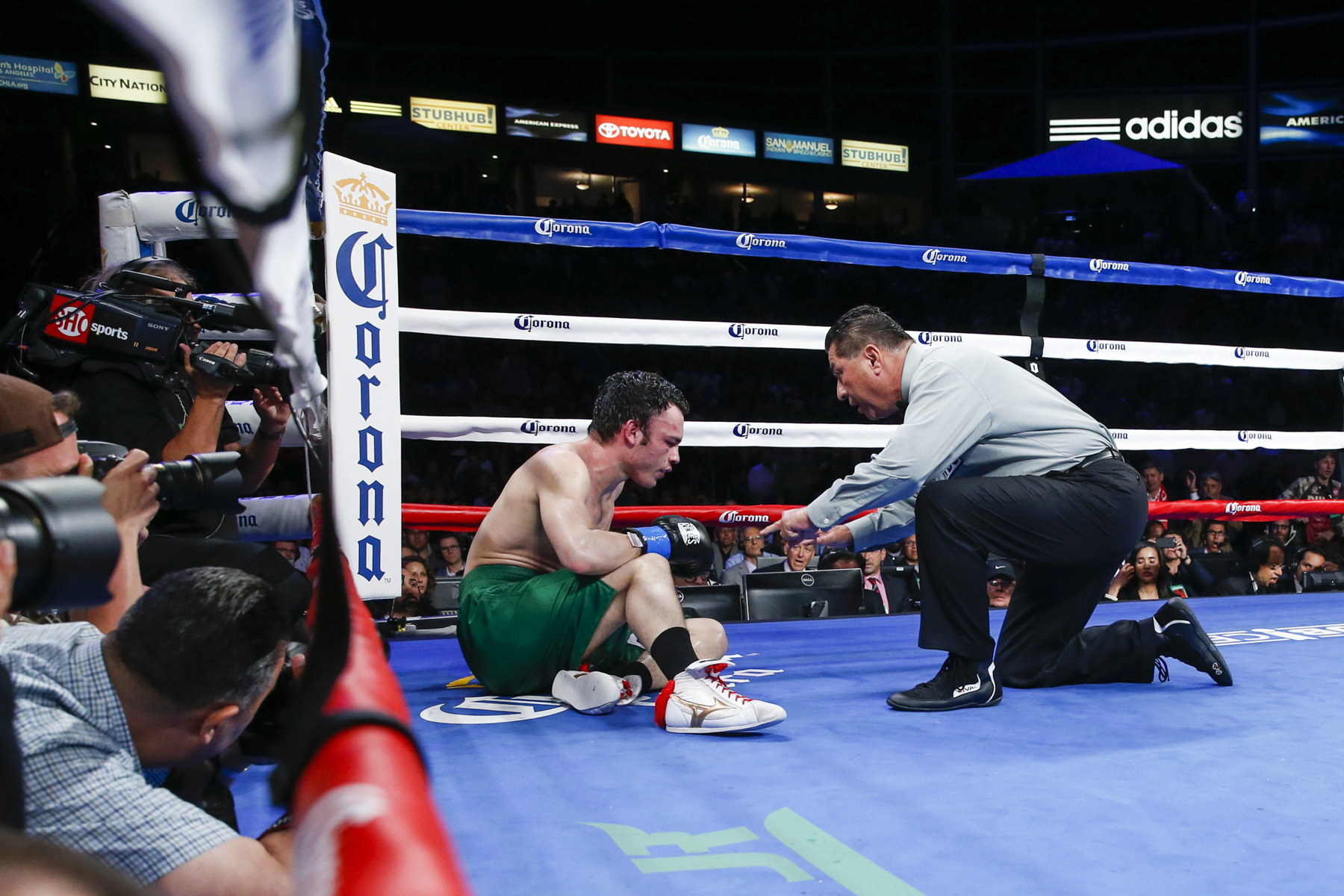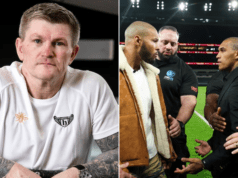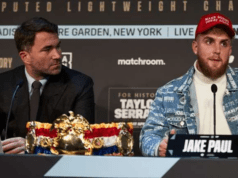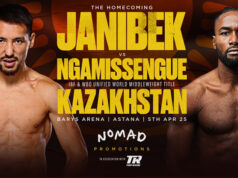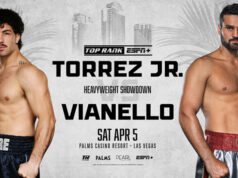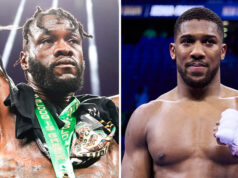One of the most recognizable names in boxing, Julio Cesar Chavez Jr. (48-2-1, 32 KOs) will attempt to get back on the winning track when he meets Mexico’s Marcos “Dorado” Reyes (33-2, 24 KOs) on Showtime on Saturday, July 18, from the Don Haskins Center at UTEP in El Paso, Texas.
Chavez is a Mexican superstar and former middleweight world champion. He’s also the son of legendary Julio Cesar Chavez Sr., a six-time world champion in three weight classes considered, by acclamation, as the greatest Mexican fighter of all time and as one of the best boxers of all time.
So who is Marcos Reyes?
“I’m the boxer who’s going to beat Julio Cesar Chavez Jr.,” he said. “I’m the one who’s going to take advantage of my opportunity of a lifetime. I’m the one who’ll show everybody that I’m a better fighter than him.
“I’ve proven to be a good fighter in my career but I’m hungry to be something more. I want to make a name for myself. I’m not intimidated. I want to beat Chavez so I can fight with the best.”
Reyes, of Chihuahua, Chihuahua, Mexico, is 27. An eight-year-pro, he stands 6-foot-1, the identical height of Chavez. Chavez is the naturally bigger boxer, of course, a fact that’s not been lost on anybody, including most certainly Reyes.
“When they told me about the Chavez fight, I couldn’t believe it,” Reyes said. “I just said, ‘OK, let’s do it.’ I just didn’t care about anything but making the fight. I wanted this fight to happen so badly.
“I’m a 160-pound fighter, but I really didn’t care about the size difference. I just wanted the chance against him. I know I’m a better fighter than him. I can do much more than him inside the ring. I can take (a punch) at my weight, I can go toe-to-toe or I can box. I can use my legs, jab, keep busy in there. He can’t.
“That’s why I’m so excited and happy about this fight. It’s the major leagues. It’s everything. It’s my chance to show the people in the world how good I am. It can open the door to all the big fights. I’m going to leave everything I have in the ring, I’m putting my whole heart on the line.”
Chavez achieved his success at middleweight but has been scrapping at super middleweight and beyond since abandoning the 160-pound division after a loss to Sergio Martinez in September 2012.
Last April 18 on SHOWTIME, Chavez took the dangerous step to move up in weight to face the naturally larger Andrzej Fonfara. Chavez, who measured 171½ pounds at the weigh-in, Chavez went down in the ninth, made it to his corner after the bell but chose not to continue in a fight he was losing by the scores of 89-80 and 88-81 twice.
Chavez has since changed trainers and will be working with Robert Garcia for the 168-pound, 10-round rumble with Reyes. Reyes will be trained for this fight by International Boxing Hall of Famer Ignacio “Nacho” Beristain. Until recently, Reyes was trained by Robert Garcia.
“This is my second fight in a row with Nacho and fourth overall,” Reyes said, “but I spent most of the last two years training with Robert at his gym. So Robert and I are on excellent terms. I know he’s training Chavez now. But I’m also sure Robert already knows that I’m a better fighter than Chavez is.”
“I saw his last fight with Fonfara; Chavez is going down now, I am going up. The right time to beat Chavez is now.”
Reyes isn’t a braggart, merely a determined, confident kid anxiously closing in on a matchup he’s wanted and dreamed of for years.
“Of course there’s pressure on me, but Chavez is the fighter with the name,” Reyes said. “Chavez is the son of a giant, but there’s a saying that goes ‘the sons of giants are dwarfs.’ They never live up to expectations and become giants like their fathers.”
Reyes does have concerns about July 18, but they don’t have anything to do with Chavez Jr.
“I am worried a little about the judges if the fight goes the distance,” he said. “Maybe I have a bad decision go against me. So I don’t want it to go to the judges. I want to finish him before the 10 full rounds.
“From the first bell, I’ll be throwing punches and I will keep throwing punches. I will do what I have to do to knock Chavez out.”
On being the son of a famous father/fighter, Reyes can empathize with what Chavez Jr., has had to endure. However, Reyes is quick to point out the inherent advantages that go along with it. He also puts some of the burden on Julio Jr., for not being his own self in the ring.
“I think it is hard to handle being the son of someone famous,” Reyes said. “His father was an icon and he wants to follow the same steps, but he didn’t have it nearly as hard as his father did. Being the son brings on its own issues. Chavez doesn’t possess the qualities his dad had yet he wants to fight like his father. But he shouldn’t. His dad was short, he’s tall. He shouldn’t try to fight like him at all.
“Chavez is his son and has the same name, but in the ring he’s just a guy with the name of Julio Cesar Chavez. He’s not the same as his father and will never be.
“I just don’t see Chavez as a better boxer than me.”
Like the vast majority of Mexican boxers, Reyes idolized Chavez Sr.
“Julio Sr. was one of my first idols. I remember watching him when I was five,” Reyes said. “He was one of the main reasons I started to box. Then when I watched Oscar De La Hoya he became one of my idols. I saw a lot of their fights. And Roy Jones Jr.’s fights, too; he was also one of my idols.”
At one time during the past year Reyes was world-ranked at middleweight in the WBC (No. 9) and the IBF (No. 15). He’s campaigned almost exclusively in Mexico where he defeated a string of tough, rugged contenders. This will be his fourth U.S. appearance, second in three fights and second in Texas.
“This is very exciting for me to fight on SHOWTIME,” the come-forward boxer-puncher said. “It’s my first main event on a major television network and I’m proud and very happy about it. This is my time and I’m going to take advantage and do what I need to do against Chavez.”
Reyes went 63-7 in the amateurs, was a six-time Mexican national champion and a representative of the Mexican National Team in both the 2006 and 2007 Pan American Games. He turned pro at age 19 in April 2007.
In his third fight Reyes captured the Mexican super welterweight title with a third-round TKO. In his seventh start and United States debut, in July 2008 in Corpus Christi, Texas, he registered a third-round TKO. Reyes, in his 11th outing, defeated one of Mexico’s all-time most popular former world champions when he outpointed Luis Ramon “Yory Boy” Campas over 12 rounds in March 2009.
Reyes made it to 13-0 before he suffered his initial loss on a 10-round decision to Amilcar Milian in 2010. After losing to Milian, Reyes won his next 19 consecutive fights before losing a controversial majority 10-round decision to El Paso’s Abie Han last Oct. 18 in Carson, Calif. Reyes’ trainer that night? Robert Garcia.
Reyes might have won two or three of the first seven rounds against Han, but he made things interesting when he scored a knockdown with 30 seconds remaining in the eighth. Han also crumpled to the canvas from a seemingly meaningless left hook to the chest that may have landed a split second after the bell sounded in the eighth. The first was scored a knockdown, the second was not.
The knockdown got Reyes back into the fight and he was on his way to winning the ninth round, too, except that the referee deducted a point from him for a late hit (short left hook to the face) that appeared to clearly connect before the bell.
“I was angry with the judges in that fight,” Reyes said. “I thought I won. I don’t know what happened. I dropped him twice in the eighth but I only got credit for one. I got credit for the first one late in the round but the second one in the closing seconds of the round I did not.”
Reyes, who has mostly campaigned at 154 and 160 pounds, tipped the scale at a personal-high 165½ pounds for his most recent fight, a unanimous eight-round decision win over David Alonso Lopez last Jan. 24. Reyes won by 77-74 twice and 76-75 despite going down in the second.


